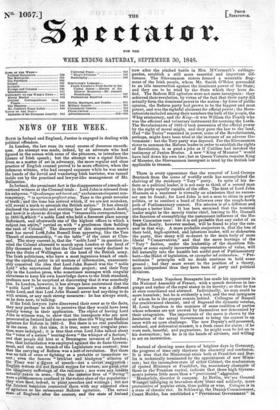NEWS OF THE WEEK.
BOTH in Ireland and England, Justice is engaged in dealing with political offenders.
In London, the law runs its usual course of decorous smooth- ness. An attempt was made, indeed, by an advocate who had figured in the scenes with some of the prisoners, to introduce the licence of Irish speech; but the attempt was a signal failure. Even as a matter of art in advocacy, the more regular and close practice of English counsel proved to be more effective, when the infamous witness, who had escaped exposure while he was under the hands of the fervid and wandering Irish barrister, was turned inside out by the practised and lawyer-like management of Mr. Ballantine.
In Ireland, the prominent fact is the disappearance of amuch-ad- vertized witness at the Clonmel trials : Lord John is released from his subpcena. "Quodcunque sub terni est," exclaims an eloquent con- temporary, " in aprieum proferet cetas. Time is the great revealer of truth ; and the time has arrived which, if we are not mistaken, will reveal a truth to astonish the British nation." It has already disclosed the mournful and startling fact of Queen Anne's death, and now it is about to divulge that treasonable correspondence," in 1831-2,which "a noble Lord who held a foremost place among Reformers, and afterwards one of the highest offices to which a subject can aspire," carried on with " a gentleman then holding the rank of Colonel." The discovery of this stupendous mare's nest has saved Lore John Russell from appearing, like the Tom Thumb of statesmanship, " on the table" of the court at Clon- mel. The story current is, that the "noble Lord" in question in- vited the Colonel aforesaid to march upon London at the head of fifty thousand men; but that the Colonel very wisely declined to brave the Duke of Wellington at the head of the British army. The Irish politicians, who have a most ingenious knack of omit- ting the cardinal point in all matters of information, unaccount- ably conceived the idea that Lord John Russell was the " noble Lord" who entertained that dramatic project; and their Tory ally in the London press, who sometimes manages with singular cleverness to keep his own knowledge down to the Irish standard, professes now to be surprised at discovering that it was somebody else. In London, however, it has always been understood that the "noble Lord" referred to by these innuendos was a different noble Lord, and that Lord John Russell never had anything to do with armies, or any such strong measures: he has always stuck, as he does now, to talking. If the Irish lawyers have discovered their error as to the facts, they may perhaps be able to perceive that they would have been equally wrong in their application. The object of having Lord John as witness was, to show that the insurgents who are now prosecuted in Ireland had done no more than the Whig and Radical agitators for Reform in 1831-2. But there is no real parallelism in the cases. At that time, it is true, some very irregular prac- tices were indulged ; it is true that even Lord John talked about the "voice of a nation" bearing down "the whisper of a faction," and that people did hint at a Brumagem invasion of London; true, that intimidation was employed against the de facto Govern- ment, and that one branch of the Legislature was coerced; true that the carrying of Reform was a sort of revolution. But there was no talk of arms or fighting as a probable or immediate re- sort ; even the famous "brickbat and bludgeon" allusion of the Times was • a figure of speech—not a covert suggestion : English writers did not furnish recipes for torture, nor gloat (Pier the imaginary sufferings of the racoats ; nor were any leaders actually:' taken in arms. Even the anterior fires of " Swing " were a pheanomenon confined to the rudest class of the population: they were used, indeed, to point speeches and writings ; but not the faintest suspicion connected' them with any educated class of agitators or the subsequent Reform acritation. The actual state of England after the contest, and the state of Ireland now after the pitched battle in Mrs. M'Cormack's cabbage- garden, establish a still more essential and important dif- ference. The Slievanamon rioters formed a miserable frag- ment of the Irish people, whom Mr. Smith O'Brien persuaded to an idle insurrection against the dominant power of the State; and they are to be tried by the State which they have de- fied. The Reform Bill agitators were not mere insurgents : they achieved their revolution, by virtue of the fact that their party did actually form the dominant power in the nation : by force of public opinion, the Reform party had grown to be the biggest and most potent, and was the rightful claimant for official power ; the Revo- lutionists included among their numbers the bulk of the people, the Whig aristocracy, and the King—it was William the Fourth who was the efficient and voluntary instrument for coercing the Lords. The Revolutionists of 1831-2 took possession of the official power by the right of moral might, and they gave the law to the land. Had "the Tories" remained in power, some of the Revolutionists, perhaps, might have been tried at the instance of an adverse Go- vernment: but the Tory party was deposed. For the Slievanamon rioter to summon the Reform leader in order to establish the rights of Revolution, is as good a joke as if Catiline had invoked the testimony of Junius Brutus. A new "King of Munster" would have laid down his own law; but as Queen Victoria remains King of Munster, the Slievanamon insurgent is tried by the British law applicable to treason.


























